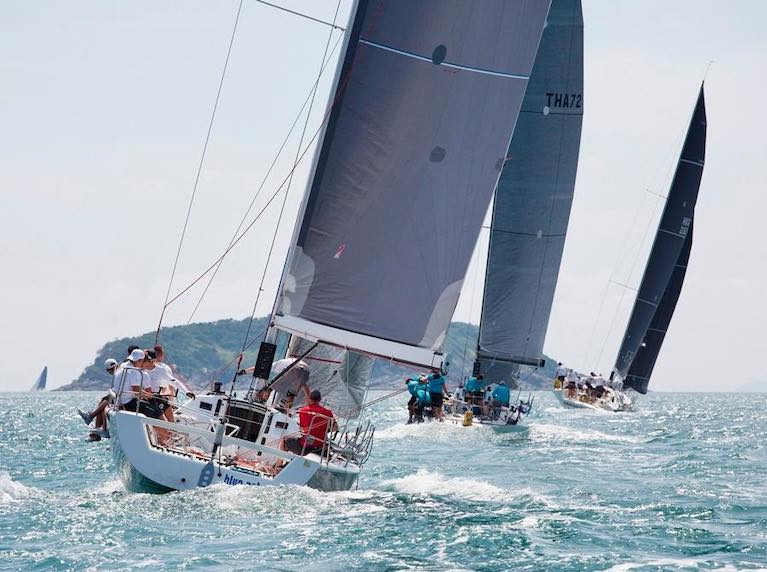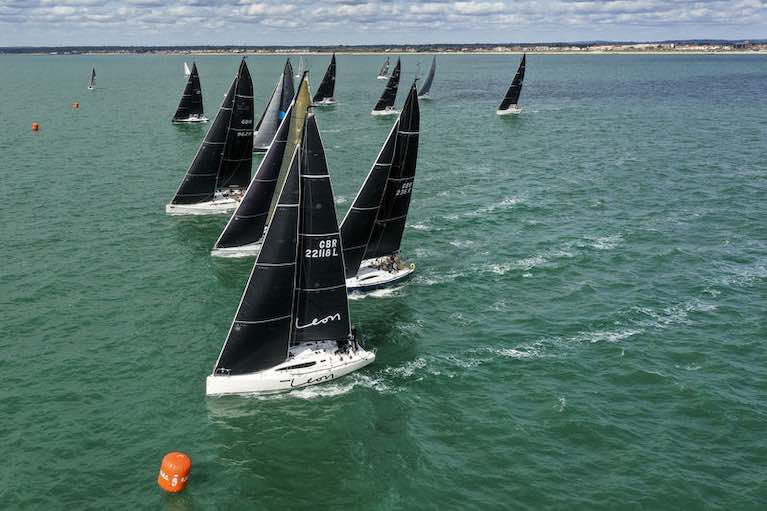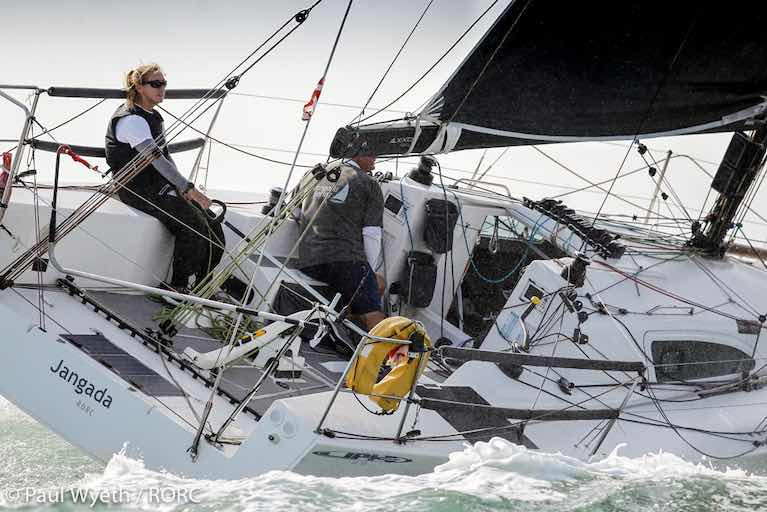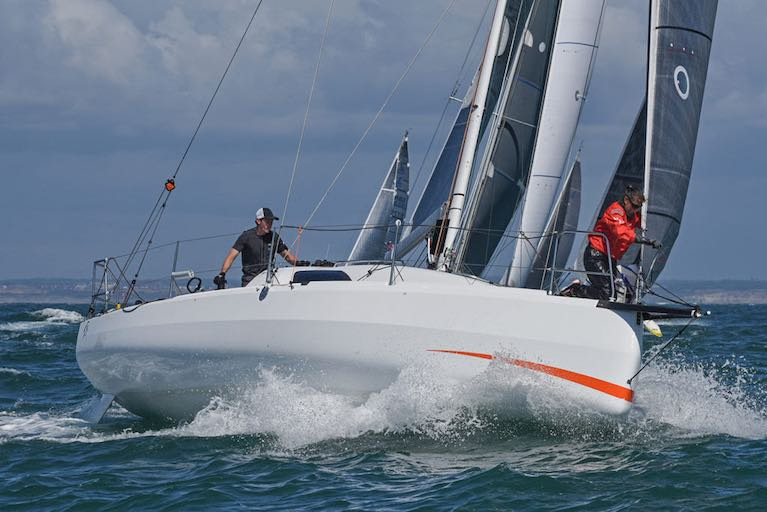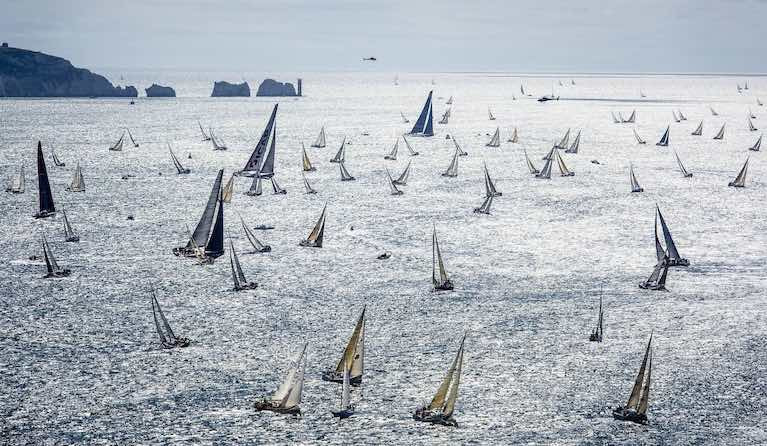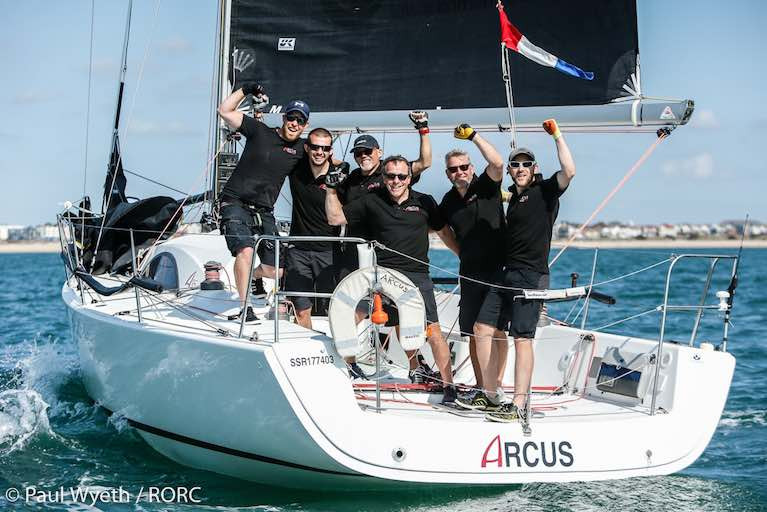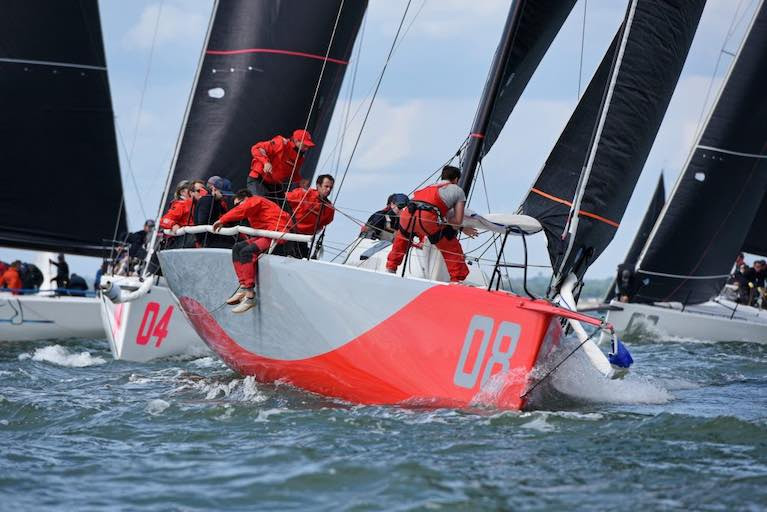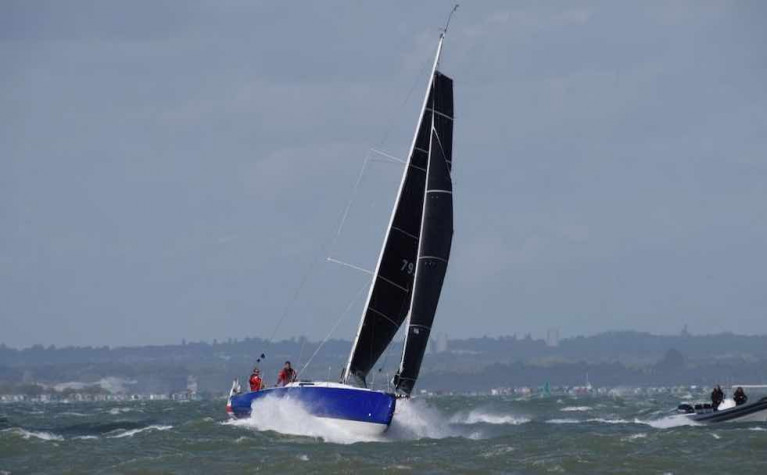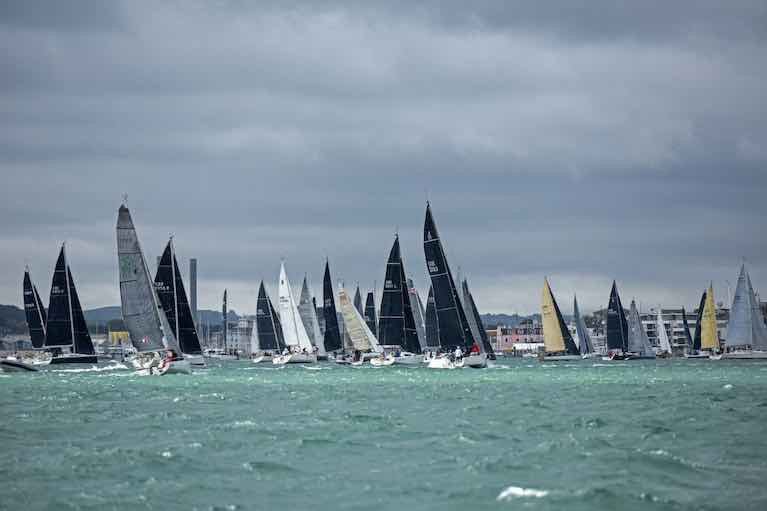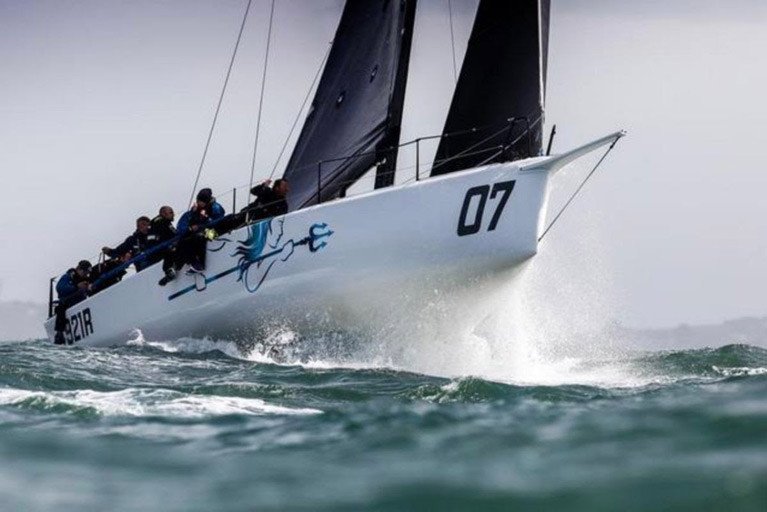Displaying items by tag: RORC
IRC Congress 2020 Chaired by Royal Irish Yacht Club's Michael Boyd
Representatives of the International Rating Certificate (IRC) from around the world met at the beginning of October for the annual IRC Congress to discuss the past IRC season and future developments. This year the planned gathering in London was not possible due to Coronavirus so the meeting was held online with delegates joining the meeting from varied time zones as far apart as the East Coast USA and Japan. One IRC representative joined the meeting from aboard his boat in autumnal Finland.
Irish interests at Congress were represented by Richard Colwell from ICRA, Mark Mills representing Irish Owners and Liz Hall from the ISA.
IRC Congress 2020 was chaired for the second year by Royal Irish Yacht Club sailor Michael Boyd, supported by Vice-Chairman Carl Sabbe of Belgium. Congress was sorry to hear that after 12 years of service Malcolm Runnalls has stepped down as IRC International Owners’ Representative and IRC Committee Vice Chairman. Malcolm has been involved in IRC from the point of view of a sailor, measurer and independent representative for many years and was instrumental in the introduction of IRC into Australia; his insights and wisdom will be missed. Stepping into Malcolm’s shoes is Simon James, another long time user and supporter of IRC, owners’ representative in South East Asia and a well-known Principal Race Officer across Asia.
Delegates gathered from across Europe, Scandinavia, Brazil, Japan and the USA; and from organisations including RORC, UNCL, the Royal Yachting Association and the International Maxi Association. Due to the online format and time zone constraints this year’s conference lacked the usual informal discussions enjoyed by delegates to share experiences and ideas from different perspectives and racing cultures, but more informal online meetings and discussions are expected to take place during the next year.
A number of technical developments were proposed by the IRC Technical Committee for 2021 and agreed by Congress. These include the addition of ‘flying headsails’ to the IRC sail inventory; more equitable treatment of spinnaker and whisker poles; and recognition that it is not currently possible to rate fully foiling boats fairly within the existing IRC fleet, although the Technical Committee will be exploring ways to rate these exciting, fully foiling boats in the future.
The Royal Ocean Racing Club (RORC) and l’Union Nationale pour la Course au Large (UNCL), joint owners of IRC, work closely together on a day-to-day basis through their respective rating offices with both offices accessing the IRC software on the same server, on research and technical development and on overall governance of the rule. This relationship has been further strengthened over the last year with a new collaborative agreement that will come into effect on 1 January 2021. This will result in integration of the teams based in UK and France, both employees and volunteers in one single structure, although geographical location of individuals will be maintained. We will continue to use online communication tools to manage this international team. This consolidation will enhance IRC’s operations, development and research of IRC with the the aim of delivering the best service to sailors and race organisers. RORC and UNCL look forward to the continued success of IRC racing.
Fastnet Race 2021
Some exciting events are scheduled for 2021 including the IRC European Championship to be held in Hyeres, France in June; and the Rolex Fastnet Race in August which will finish in Cherbourg-en-Cotentin for the first time. The joint IRC/ORC World Championship due to be held in Newport, RI in September 2020, unfortunately, fell victim to Coronavirus with overseas entrants unable to travel to join the event. The next World Championship is expected to be held in 2022.
The Congress Minutes, IRC 2021 rule changes and other associated documents are online here
Clubs running yacht racing using the International Rating Certificate (IRC) rating rule can find a myriad of useful resources on the IRC website, including the Race Management Guidelines which have recently been updated with some useful tips picked up from clubs running racing during the Coronavirus pandemic. These updates include ideas for reducing crew numbers and highlighting the benefits for club racing.
Race format suggestions have been added that can reduce the number of race support personnel required. There is also an additional section on ways of encouraging youth and mixed-gender to IRC racing using the crew number limits.
The Race Management Guidelines range from the basics of how to invoke IRC rules to advice for clubs who would like to tailor the rules in more detail in their Notice of Race, where permitted. Subjects include class split ideas, rating change deadlines, crew limits, endorsed certificates, non-spinnaker and short-handed racing, protests, and safety and stability screening. There are also recommendations on course setting, dual scoring with performance handicap, policing and equipment inspection.
A very useful tool for clubs is the online list of boats holding a current IRC certificate; boats must hold a current certificate to race and these expire on 31st December (or 31st May in some countries) each year. The online list is updated every evening and has a search facility as well as the option to download the full list.
As part of its Racing Rules Guidance the Royal Yachting Association in the UK publishes guidance on protests concerning alleged breaches of IRC rules and these can also be found on the IRC website.
To access all this information see the IRC Racing section here
Jangada Wins RORC Two-Handed Autumn Series
Richard Palmer’s JPK 10.10 Jangada, raced by Jeremy Waitt and Shirley Robertson, won the final race of the Royal Ocean Racing Club’s 2-H Autumn Series to take overall victory in the three-race series. Rob Craigie & Deb Fish’s Sun Fast 3600 Bellino was series and race runner-up. In third place for the series was Daniel Jones’ Sun Fast 3300 Wild Pilgrim. In third place for the final race was Nigel Goodhew’s Sun Fast 3200 Cora, sailed by Tim Goodhew & Kelvin Matthews.
The final race of the Royal Ocean Racing Club’s 2-H Autumn Series was a 103nm overnight race. Starting from the Squadron Line, the fleet headed east out of the Solent on a fast reaching angle to a virtual waypoint off Worthing. A return leg followed with a beat to Winner Buoy and then around the South of the Isle of Wight passed St Catherine’s Point. Close-hauled in big breeze it was a bumpy ride up to The Needles Fairway Buoy. The fleet came off the breeze, to race through Hurst Narrows, and onto the finish off the RORC buoy in the Central Solent.
“With Richard (Palmer) having a knee operation and the COVID situation, this year looked like it was going to be a write-off, “commented Jangada’s Jeremy Waitt. ” However, to win this series was great, and to race with Shirley Robertson was just fantastic. Shirley is very skilled at getting the best speed out of the boat and also has incredible endurance. Last night we were beating into 27 knots, it was on the nose and very lumpy, but she just dug in and we got the win.”
“It has been great fun racing with Jeremy (Waitt) and a big thank you to Richard Palmer for letting us race Jangada,” commented Shirley Robertson. “Jeremy has done so much two-handed racing, he is a really wise head on the boat. I have learnt a lot about the importance of risk management, including concentrating on the important decisions to come. I have to say a massive thanks to RORC. The double-handed class have had the best racing out of anyone; the racing has been really varied. Well done to the RORC for giving us a great summer, the enthusiasm from the club and the sailors has been exceptional.”
RORC Racing Manager, Chris Stone commented: “For the first time in the history of the club the RORC Season’s Points Championship had to be cancelled due to the pandemic. However, the appetite for racing was still there and we have had great feedback from the competitors in both the Summer Series and the 2-H Autumn Series. We have so much to look forward to, especially the highlight of 2021, the Rolex Fastnet Race.”
For full results here
Sun Fast 3300 Gentoo Wins Race Two of RORC Two-Handed Series
James Harayda & Dee Caffari, racing Sun Fast 3300 Gentoo, have won the second race of the RORC IRC Two-Handed Autumn Series. Gentoo took line honours in the 128nm race as well as the win on IRC corrected time. Richard Palmer’s JPK 10.10 Jangada, raced by Jeremy Waitt and Shirley Robertson, was second, less than five minutes ahead of Sun Fast 3200 Cora, raced by Tim Goodhew & Kelvin Matthews.
The overnight race was held in blustery conditions with about 25 knots from the north to north-west. The RORC Race Committee set a course taking in all points of sail and requiring strategic decisions, especially with regards to tidal current and also for wind shadow on the southside of the Isle of Wight.
Undoubtedly the best start was made by Nicola Simper’s S&S 34 Blueberry, starting the race at full pace at the Squadron Line. The RORC fleet headed as far west as East Shambles buoy with Outer Nab 2 forming the most easterly point of the course. After a night of hard racing south of the island, the fleet hankered down for a beat back into the Eastern Solent to finish in the early hours of the morning.
James Harayda is just 22-year-old and racing Gentoo with Dee Caffari who has sailed around the world six times. Dee is the first woman to have sailed single-handed and non-stop around the world in both directions. Harayda & Caffari have their sights set on representing Great Britain in the Two Person Offshore Keelboat Event for the Paris Olympic Games in 2024.
“You forget who you're sailing with very quickly, Dee doesn't come with an ego despite having achieved such amazing things,” commented James Harayda. “It's a really nice dynamic on board, Dee brings a huge amount of experience that I haven't had, I think our skills complement each other quite nicely.”
Listen to the full interview with James Harayda
The Royal Ocean Racing Club’s Two-Handed Autumn Series comes to a conclusion with the last race scheduled to start on Saturday 10th October. Jangada leads the series, followed by Daniel Jones’ Sun Fast 3300 Wild Pilgrim. Rob Craigie & Deb Fish’s Sun Fast 3600 Bellino is third.
Navigating the New 2021 Fastnet Race Course – More Reaching & a New Roll of the Dice
Moving to Cherbourg for the finish of the Royal Ocean Racing Club's premier event, the Rolex Fastnet Race next year will see navigators and crews facing a few significant new challenges writes James Boyd
Firstly the new course is 90 miles (or 15%) longer, making it 695 miles, based on the shortest route. Of this the first 500 miles (or 72%) of the course remains unchanged - setting off from the Royal Yacht Squadron line on Sunday 8 August 2021; heading southwest down the English south coast, negotiating Anvil Point, Portland Bill, Start Point and the Lizard en route, before the vital decision over which side to pass the Traffic Separation Scheme exclusion zone off Land's End. Then there are the open ocean crossings to the Fastnet Rock and back to Bishop Rock, southwest of the Scilly Isles.
 The long final leg to Cherbourg adds 90 miles to the course and is more open, but concluded with the crossing of the Alderney Race. Credit: Expedition Navigation Software & thanks to Ian Moore
The long final leg to Cherbourg adds 90 miles to the course and is more open, but concluded with the crossing of the Alderney Race. Credit: Expedition Navigation Software & thanks to Ian Moore
From here the course changes marginally. From Bishop Rock, it is possible to lay directly Cape de la Hague, the northwesternmost headland of the Cotentin Peninsula, before making the final slight starboard turn for the last 10 miles to the finish line within Cherbourg's harbour. The new course from Bishop Rock is 91°M, compared to 83° to the Lizard, however, the added distance to Cherbourg may affect the make-up of the race overall.
 While the race requires an all-round boat, the new course remains predominantly windward-leeward, albeit more downwind. Credit: Ian Moore
While the race requires an all-round boat, the new course remains predominantly windward-leeward, albeit more downwind. Credit: Ian Moore
More significant will be the final roll of the dice: how best to tackle one of Europe most powerful tidal gates - the Alderney Race, between Alderney and Cape de la Hague. "This is now the biggest tidal gate of the race," states Moore. "It is strongest off Cape de la Hague, through the Swinge (between Alderney and Burhou, northwest of Alderney) and off the eastern Alderney shore. The tidal effect also covers a much larger area than it does off Portland Bill. There will be winners and losers here and it will be hard to get right."
The Alderney Race’s effect will also be increased after start day’s new moon, with finishers into Cherbourg expecting during a period with a very high tidal coefficient (86-89). The good news is that the Alderney Race runs slightly faster in the fair northerly-northeasterly direction than it does when it is foul. Moore says that navigators will be keenly anticipating their arrival time at the Alderney Race. If it is when it is unfavourable then they try to gain tidal relief by leaving Alderney to port or, more dramatic still, sidestepping the Alderney Race altogether by approaching Cherbourg from the north. This latter route is made less attractive due to the location of the Casquets TSS exclusion zone that forces boats to stay south, unless they wish to round its north side, requiring them to sail 11 additional miles.
 Those lucky enough to arrive at the Alderney Race in fair tide can expect a 4-6 knot boost to their speed. Credit: Expedition Navigation Software & thanks to Ian Moore
Those lucky enough to arrive at the Alderney Race in fair tide can expect a 4-6 knot boost to their speed. Credit: Expedition Navigation Software & thanks to Ian Moore
UK-based Kiwi navigator Campbell Field was part of the overall winning crew on the 2003 Rolex Fastnet Race on Charles Dunstone’s maxi Nokia and last year was on the top British finisher under IRC, David Collins’ modified TP52 Tala.
His assessment of the new course is similar to that of Ian Moore: “If you look at the prevailing conditions you could expect on an average year with southwesterlies, it will shift the proportions of the race – if it was predominantly upwind and tight reaching and around one third was broad reaching and running - it will flip those proportions. So there will be more open angle sailing. Also the majority of the race will now be post-Fastnet Rock rather than before it. With more downwind, it could well favour the broad reaching/downwind machines that can plane.”
As to the new long final leg between Bishop Rock to the finish, Field observes that while the old course used to be mostly a coastal race, the route to Cherbourg is much more open. “That’s good because there will be weather changes over that period.”
As to the Alderney Race, Field adds: “It is just another obstacle to negotiate, no different to the other tidal gates, but it is something that’ll have to be analysed coming back from the Fastnet. It will be time dependent and if your timing is stacking up to be an hour before or after the tidal gate, that could have a major impact on your race whereas if you get there in the middle of the flow, your strategy is pretty much dictated to you: Get in it and crack on or avoid it! It just adds another interesting navigational dynamic, a new dimension, to the race. I enjoy doing races like the Fastnet because you have constant stimulation...”
 Cherbourg will host the finish of the Rolex Fastnet Race for the first time next August. Online entries open in January 2021. © Marc Lerouge
Cherbourg will host the finish of the Rolex Fastnet Race for the first time next August. Online entries open in January 2021. © Marc Lerouge
The new finish in Cherbourg is due to the joint co-operation of the City of Cherbourg-en-Cotentin, the Communauté d’agglomération du Cotentin, the Conseil départemental de la Manche and Région Normandie with the RORC. While French boats have dominated recent editions of Rolex Fastnet Race, good knowledge especially of the Alderney Race (or Raz Blanchard as it is known locally) is certain to benefit local residents. One is the 2013 winner, Alexis Loisin, who warns: “Raz Blanchard - there is a lot of current there and maybe the gate there will be open or closed, so you will certainly be able to win or lose the race in the last hours. Your timing must be good – so it is good to have Rolex as a sponsor!”
As Afloat reported previously, Carrickfergus navigator Ian Moore gave an overview of the new course on youtube here
Ex 'Fools Gold' Arcus Prevails in UK IRC championships on the Solent
Former successful Irish A35 Fools Gold is continuing her winning ways in new hands on the Solent, lifting an IRC title in Cowes at the weekend under her new name Arcus.
Mid-September it may be, but conditions for the Royal Ocean Racing Club’s 2020 IRC championships felt more like June this weekend, with shorts and T-shirts conditions and allowing a full schedule of racing to be laid on by PRO Stuart Childerley and his team. The event concluded today with two windward-leeward races on the central-eastern Solent in more variable and generally lighter winds than on Friday or Saturday.
Despite being new to their A35 Arcus, John Howell and Paul Newell’s crew managed perfect scorelines on day one and today to win not just IRC Three, but the IRC National Championship overall. Given their lack of familiarity with their boat, to earn themselves this coveted title, said Newell “...was beyond our wildest expectations. We were trying to improve our crew and it turned out to be a very successful first outing - an amazing result! It has been a fantastic regatta. There’s been some great racing. I haven’t heard a bad word said about it - thanks very much RORC.”
Conditions this weekend allowed the Arcus crew to try out all their sails including their #1 jib in today’s lighter winds. “Today was a lot nicer although there was a weird tide line and IRC Two weren’t taking any prisoners when we got in among them,” continued Newell.
Demonstrating how the RORC’s IRC rating rule smiles on professionals and amateurs alike, the Arcus crew is firmly in the latter camp, comprising principally co-owners Howell and Newell and their sons, who come from the Buckinghamshire area.
 Winner of IRC One - Niklas Zennström’s FAST40+ Rán Photo: Paul WyethRAN
Winner of IRC One - Niklas Zennström’s FAST40+ Rán Photo: Paul WyethRAN
At the opposite end of the IRC spectrum, a 1-3 today was enough to comfortably secure Niklas Zennström’s FAST40+ Rán victory by five points in IRC One, but a few uncharacteristic blemishes on their scoreline dropped them to second overall.
Having led the fleet around the race track this weekend, Tony Langley’s TP52 Gladiator finally made up her time to secure her first win of the event in today’s final windward-leeward. “I was a bit rusty, but it is just like falling off a bike!” quipped Langley. “What a great weekend - we couldn’t have picked better weather. It was very enjoyable, nice conditions and good race management. It was nice to be back on the water.” This was Langley’s first event of 2020.
 IRC Two winner - David Franks J/112E Leon Photo: Paul Wyeth
IRC Two winner - David Franks J/112E Leon Photo: Paul Wyeth
The hardest fought victory across the three classes was that of 2012 winner David Franks aboard his J/112E Leon. They had been handicapped with Franks only coming out of COVID-19 isolation on Friday; maths not working in their favour from the event’s mandatory crew number reduction rules (for social distancing), but mainly from being one of the lowest rated boats in IRC Two and having to find lanes and constantly fight their way up through the fleet. On the plus side the Leon crew had sailed together previously this year. Otherwise, Franks had no complaints: “It has been fabulous, a very good event, well organised. It was lovely to see so many boats out on the Solent.”
Leon posted a 1-2 today with Robert Bottomley’s MAT 12 Sailplane 3 first in the final race. “Normally we do well in the light, despite the fact that we are the smallest boat,” continued Franks. “Today the wind’s velocity was going up and down and was all over the place in direction, so it was hard to know what was going on. It was very challenging, a lot of work.”
 Celebrating their overall win in the IRC Two-Handed Championship - Dee Caffari and James Harayda on their Sun Fast 3300 Gentoo Photo: Paul Wyeth
Celebrating their overall win in the IRC Two-Handed Championship - Dee Caffari and James Harayda on their Sun Fast 3300 Gentoo Photo: Paul Wyeth
Running alongside has been the IRC Two-Handed Nationals. With the increased popularity of this discipline due to it being social distancing-friendly and becoming an Olympic event for Paris 2024, the fleet was packed with talent. Going into the final day Dee Caffari and James Harayda on the Sun Fast 3300 Gentoo was tied with Jeremy Waitt and double Olympic gold medallist Shirley Robertson on Richard Palmer’s JPK 10.10 Jangada. However a 1-3 was enough to secure Gentoo the title as Jangada’s 4-4.5 caused her to drop off the podium, albeit just one point short of second.
Caffari and Harayda coming second in the Drheam Cup was enough to gain them the GBR berth in the recent EUROSAF Mixed Offshore European Championship, where their result was disappointing. As Caffari explained: “We were selected, but had to pay to go: We went to Italy, sailed in an unknown venue on an unknown boat with no support. We had a good inshore race and then made some critical errors offshore and didn’t have the performance we wanted. We were determined to come here and prove a point about why we were selected. We are delighted with our result.”
Gentoo was launched in today’s first race, consolidating their lead on the second leg of their round the cans race by committing to their powerful Code 0 early, but then suffering after being rolled by Gladiator.
Caffari was pleased by the quality of the fleet: “A lot of sailors were here who know what they are doing and know these waters and the tides. It is about eliminating errors and getting around the course cleanly.”
Race Committee
 It was a great weekend of racing on the Solent for the IRC Nationals and IRC Two-Handed Championship run by the RORC Race Team Photo: Paul Wyeth
It was a great weekend of racing on the Solent for the IRC Nationals and IRC Two-Handed Championship run by the RORC Race Team Photo: Paul Wyeth
Behind them it was close with second to fifth places separated by just 1.5 points. Ultimately it was Gareth Edmondson and former Artemis Offshore Academy graduate Hugh Brayshaw, who came home second on countback after winning today’s second race by just 16 seconds. Sailing a chartered Sun Fast 3600, this result was a complete surprise for Edmondson who praised his co-skipper, with whom he last sailed doublehanded offshore two years ago. “Hugh is the genius and I just do as I’m told - an autohelm that speaks!” However Brayshaw added their success was down to trust and relying on each other. Both were delighted to be out on the water for the first time this season: “It was fantastic with people simply being able to sail and race and compete. And the standard seemed very high. It was very tight.”
Due to social distancing restrictions, no prizegiving was held.
Ino XXX & Redshift Celebrate RORC Series Success in Cowes
The Royal Ocean Racing Club's Summer Series came to a conclusion with the fourth and final race of the RORC Summer Series. A light airs 36-mile race was held in The Solent. Ed Fishwick’s GP42 Redshift took line honours and the overall race win after IRC correction. James Neville’s HH42 Ino XXX was second overall, and with the result, won the four-race series. Richard Palmer’s JPK 1010 Jangada, skippered by Jeremy Waitt, was third overall for the race and for the series. 136 boats entered the RORC Summer Series, which was designed to replace part of the 2020 RORC Season’s Points Championship.
Redshift’s Nick Cherry, a six-time figarista commented: “We really enjoyed this race and the series. Racing with six people, instead of ten, you really have to focus all the time and whilst we adapted our manoeuvres, we made no changes to the systems on board. When we get back to fully-crewed offshore racing, this has served as great practice, as you are in a watch system, often without the full complement of crew on deck.”
Congratulations to the class winners of RORC Summer Series Race 4 including Ed Bell’s JPK 1180 Dawn Treader and Sun Fast 3300 Fastrak XII, sailed two-handed by Henry Bomby & Shirley Robertson.
Full Results
IRC One
Overall series winner, RORC Vice Commodore James Neville’s Ino XXX scored a first and two second places in class to win IRC One. Michael O’Donnell’s J/121 Darkwood was second in class and Rob Bottomley’s MAT12 Sailplane 3 was third.
"Well done to the RORC Race Team for coming up with the idea and making it happen,” commented James Neville. “The day races have been quite special, as it’s a good day out for the crew and a real challenge, especially racing Ino XXX with a reduced number. The series has been held in an amazing range of conditions and has been a lot of fun.”
IRC Two
Ross Applebey’s Oyster 48 Scarlet Oyster was the run-away winner of IRC Two, scoring two bullets and a third. Gavin Howe’s Sun Fast 3600 Tigris was second in IRC Two and third in IRC two-handed. Ed Bell’s Dawn Treader was just two points behind in third.
IRC Three
Olympic two-handed hopefuls, Henry Bomby & Shirley Robertson, racing Nigel Colley’s Fastrak XII took the win in IRC Three and second in IRC two-handed. Richard Oswald’s Elan 450 Emily of Cowes was runner-up. Jim Driver’s Sun Fast 3300 Chilli Pepper was third.
After the second race, double Olympic Gold Medallist, Shirley Robertson commented: “Henry is an amazing young talent who has cut his teeth in the Figaro. Henry is a good teammate and a great teacher. It’s been good to hang out with Henry for the summer.”
IRC Four
Richard Palmer’s Jangada, skippered by Jeremy Waitt, was the clear winner of IRC Four and the winner of IRC two-handed. Chris Frost’s Swan 36 Finola was second in class in the last race to finish runner-up for the series. Tony White’s Sun Fast 3300 Mzungu was third.
MOCRA Class
Nine multihulls raced during the series and the smallest of the fleet came out on top for the series. Ross Hobson’s Seacart 30 Buzz was the victor. MOD 70 Powerplay, skippered by Ned Collier Wakefield, with Peter Cunningham on the helm, was second. James Holder’s Dazcat 1295 Slinky Malinki was third.
RORC 2H Autumn Series
Whilst the RORC Summer Series has come to an end, Friday 4th of September marked the start of the 2H Autumn Series. Race One was a race of approximately 100 miles, the first over-night race organised by the RORC since February. Jangada skippered by Jeremy Waitt, was the winner. Rob Craigie & Deb Fish racing Sun Fast 3600 Bellino were second. Sun Fast 3300 Wild Pilgrim, skippered by Daniel Jones, was third. The 2H Autumn Series, consisting of three races, continues on Saturday 26th September with another overnight race for two-handed teams.
The Royal Ocean Racing Club's Summer Series Race 3 was a full-on foam up in 25 knots of breeze gusting over 30. The long day race was a course of about 42 miles for the monohulls with a beat west from the Squadron Line to East Lepe, followed by a scorching downwind leg east through the Solent. After bisecting No Man’s Land and Horse Sand Forts, the downwind sleigh ride took the fleet to Pullar, northeast of the Nab Tower. The final leg was a beat to finish at the Squadron Line.
The stand-out performance in the race was Sun Fast 3300 Fastrak XII, raced Two-Handed by Henry Bomby & Shirley Robertson. Fastrak XII was the overall winner after IRC time correction and the victor in both IRC Three and IRC Two-Handed.
Bomby and Robertson have set their sights on representing Great Britain in the 2024 Olympics. Bomby is one of Britain's most promising young sailors having raced in four Solitaire du Figaro campaigns, the Volvo Ocean Race and two years with the MOD70 Phaedo3. Shirley Robertson has won two consecutive Olympic Gold medals, and whilst Robertson has offshore experience, the Two-Handed offshore discipline is a new experience.
“Henry is a legend!” commented Shirley Robertson. “We just felt really solid, never on the edge. We made decisions in anticipation and thought it through, making very few errors and sailed a really clean race. The rust is coming away gradually and although offshore racing is a bit unfamiliar for me, a small boat is my bread and butter. We are getting faster and faster, and I have got to say, Henry is an amazing young talent who has cut his teeth in the Figaro. Henry is a good teammate and a great teacher. It’s been good to hang out with Henry for the summer.”
Congratulations to all of the IRC Class Winners in the RORC Summer Series Race 3. Ross Applebey’s Oyster 48 Scarlet Oyster was the winner of IRC 2 and second overall, Scarlet Oyster scorched around the racetrack in an elapsed time just three seconds shy of Fastrak XII. Rob Bottomley’s MAT12 Sailplane 3, skippered by Nick Jones, took Line Honours for the race, was third overall, and winner of IRC One. Richard Palmer’s JPK 10.10 Jangada, sailed by Jeremy Waitt and Paul Wood, won IRC Four. Ross Hobson’s Seacart 30 Buzz won the Multihull Class.
During the race, Tom Kneen’s JPK 1180 Sunrise was dismasted. However, none of the crew were injured and all returned safely to shore. Tom Kneen expressed his gratitude to the assistance offered by fellow competitors; James Neville’s Ino XXX, Darkwood skippered by Steve Lawrence, and Rob Bottomley’s Sailplane 3.
Full details of the revised RORC racing programme can be found on the RORC website, but in summary: permitted crew offshore can be up to a maximum of six people from any household or two-thirds of a boat's IRC crew number whichever is the least. Competitors are also reminded of the government guidance on social distancing and other Covid-19 measures.
The Royal Ocean Racing Club's Summer Series comes to a conclusion with the fourth and final race scheduled for Sunday 6th September. Further racing with the club is set to continue in September with a new Two-Handed Autumn Series (4th, 26th Sept. & 10th Oct.) as well as the IRC National Championship (11/13 Sept.) and the IRC Two-Handed National Championship (12/13 Sept.)
RORC Cancels Season’s Points Championship
For the first time in the history of the London club, the RORC Season’s Points Championship has had to be cancelled. Current restrictions continue to make it impossible to run overnight races for all IRC classes with the result that the last offshore race of the season, the Cherbourg Race has had to be cancelled. With only two races, the RORC Transatlantic Race and the RORC Caribbean 600 having been completed, and three required to constitute a series, the club has had no option but to cancel the 2020 Season’s Points Championship.
“This has been a difficult and unprecedented decision for the club,” said RORC Commodore Steven Anderson. “We were very keen to have one proper offshore race for all classes to allow us to complete the series. We all hoped that by September the restrictions to control the spread of the virus would have been eased sufficiently to allow a sprint to Cherbourg and a good way to end a very frustrating season for all.”
RORC Two-Handed Race to Cherbourg
Instead of the usual season ending Cherbourg Race, the RORC has confirmed the intention to run a two-handed race to Cherbourg. This race which will start on Friday 4th September is in line with current government regulation and has added significance in that the City of Cherbourg will host the finish of the Rolex Fastnet Race for the 2021 and 2023 editions.
RORC Racing Manager Chris Stone has been delighted with the number of teams who are participating in the summer series.
“We were pleased to have 133 boats in ‘Race the Wight’, the first race of our Summer Series and interest in the rest of the series is very strong. We decided to start the two-handed race to Cherbourg on the Friday to give the opportunity for those two-handed teams who are involved in the summer series to participate in the last race of the series which is scheduled for Sunday 6th September.”
The RORC Summer Series consists of three additional races on Saturday 15th August, Saturday 22nd August and Sunday 6th September.
85 Entries for RORC Race the Wight
The Royal Ocean Racing Club is expecting in excess of 100 entries for Race the Wight, scheduled to start on Saturday 1st August. All entry fees will be donated to the NHS Trust and the Scaramouche Sailing Trust. Race the Wight will be the first of a four-race RORC mini-series during August and September.
“As a charity, we rely on donations and grants. Every pound we receive goes towards getting more students from different backgrounds sailing,” commented Jon Holt, Scaramouche Sailing Trust. “Our next big goal is to be on the start line of the Rolex Fastnet Race 2021. We are grateful for the ongoing support from RORC and proud to be named as one of the charities for the race.” The Greig City Academy will have upwards of a dozen students on different boats for the race.
IRC Classes for the 50nm race around the Isle of Wight are still to be confirmed. However, early entries indicate a fleet full of champions with any number of potential victors.
RORC Vice Commodore James Neville racing his HH42 Ino XXX and Ian Atkins’ Melges IC37 Icy are favourites for monohull line honours. The overall winner of the Race the Wight will be decided by time correction using the IRC Rating System. In big upwind conditions Sir Geoffrey Mulcahy’s Swan 56 Noonmark IV, skippered by Mike Gilburt, will be a force to be reckoned with. Given the crew limitations and favoured wind conditions, Greg Leonard‘s Class40 Kite (Prev. Maxime Sorel’s V and B, winner 2017 Rolex Fastnet Race) should blast round the island.
 Ian Atkins’ Melges IC37 Icy
Ian Atkins’ Melges IC37 Icy
 Greg Leonard's Class40 Kite Photo: John Green Cowes
Greg Leonard's Class40 Kite Photo: John Green Cowes
“We are looking forward to it,” commented James Neville. “It’s been completely frustrating to have missed racing. We have been modifying the boat over the winter and part of this race will be to test and learn what can be done. The race will give us the experience to move on to the next steps in terms of how we can race the boat given the current restrictions. We have had one training session and it is certainly all on when we gybe. However personally, I wouldn’t go out if we were unable to use spinnakers because it is important to get the boat lit up. We will be racing with six and be taking all the necessary precautions.”
“I am beyond excited!” Exclaimed Ian Atkins. “The challenge now is whittling a crew of nine down to six, but we will probably rotate the crew during the mini-series. Everybody on board is very capable, so they should all get a chance to race during the series. You need all nine crew in a blow on a short windward leeward race, but round the Wight is perfect to stretch our legs without too many corners to negotiate.”
 Tom Hayhoe and Natalie Jobling will be racing J/105 Mostly Harmless Two-Handed and both work for the NHS Trust. Photo: Rick Tomlinson
Tom Hayhoe and Natalie Jobling will be racing J/105 Mostly Harmless Two-Handed and both work for the NHS Trust. Photo: Rick Tomlinson
18 J/Boats have already entered the race, Tom Hayhoe and Natalie Jobling will be racing J/105 Mostly Harmless Two-Handed and both work for the NHS Trust. Michael O’Donnell’s J/121 Darkwood won last year’s RORC Channel Race and will be competing with a crew of five.
“With water ballast and a sail configuration designed for short-handed sailing, we are actually sailing with our optimum crew, even with the restrictions,” commented Michael O’Donnell. “The race around the Isle of Wight, starting at the Royal Yacht Squadron, is possibly the most iconic in the world - we just can’t wait to get out there.”
"The permitted crew can be up to a maximum of 6 people from any household or two-thirds of a boat’s IRC crew number whichever is the least"
Eight examples of Beneteau’s Sun Fast yachts have entered including the overall winner of the 2019 RORC Season’s Points Championship, Trevor Middleton’s Black Sheep and last year’s season runner up Bellino, raced two-handed by Rob Craigie and Deb Fish. Two Sun Fast 3300 will be racing, Peter Bacon’s Sea Bear and Jim Driver’s Chilli Pepper.
Five JPKs have already entered, including Richard Palmer’s JPK 10.10 Jangada, overall winner of the 2019 RORC Transatlantic Race. Jangada will be facing new teams in similar designs. Peter Butters JPK 10.10 Joy, and JPK 11.80s; Ed Bell’s Dawn Treader and Astrid de Vin’s Il Corvo.
 1939 Giles one-off design Whooper Photo: Paul Wyeth
1939 Giles one-off design Whooper Photo: Paul Wyeth
 2019 Quarter Ton Cup Champion Protis. Photo: Rick Tomlinson
2019 Quarter Ton Cup Champion Protis. Photo: Rick Tomlinson
Vintage yachts abound through the fleet including some of the smallest entries, 2019 Quarter Ton Cup Champion Protis, with Ian Southworth on the tiler, will be able to gauge their performance against Tony Hayward’s Blackfun. Past RORC Commodore Peter Rutter will be racing his restored Half Tonner Quokka 9. Giovanni Belgrano is part of the structural design team for INEOS Team UK for the America’s Cup and his 1939 Giles one-off design Whooper has solid form for the race. Whooper is a past winner of the Gold Roman Bowl in the ISC Round the Island Race, beating over a thousand competitors. Ross Applebey’s Oyster 48 Scarlet Oyster will also be in action and was in fine form recently winning class once again in the RORC Caribbean 600 and overall winner of 2019 RORC Cowes St Malo.
 Simon Baker’s Dazcat 1495 Hissy Fit. Photo: James Tomlinson
Simon Baker’s Dazcat 1495 Hissy Fit. Photo: James Tomlinson
In the MOCRA Class, last year’s ISC race winner will also be competing, Simon Baker’s Dazcat 1495 Hissy Fit. Strong challengers in the multihull class include 2019 RORC Season winner, Ross Hobson’s Sea Cart 30 Buzz, and third in the 2019 RORC Season’s Points Championship, James Holder’s Dazcat 1295 Slinky Malinki.
Full details in the Notice of Race can be found in the Notice of Race but in summary: permitted crew can be up to a maximum of 6 people from any household or two-thirds of a boat’s IRC crew number whichever is the least.
Competitors are also reminded of the government guidance on social distancing and other Covid19 measures.


























